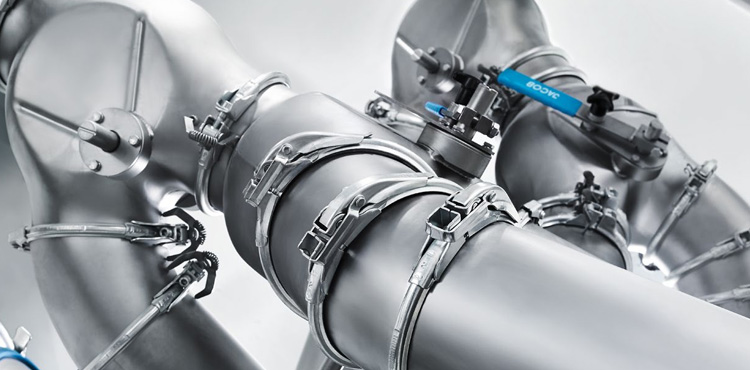The seamless handling of bulk goods is a critical aspect that directly impacts efficiency, productivity, and overall operational success. At the heart of the production process are intricate pipeworks, purposefully designed to navigate the complexities of bulk goods handling with precision and reliability.
The foundation of efficiency: material conveyance
Well-designed solutions form the backbone of material conveyance in industries where the movement of bulk goods is constant. These systems are meticulously engineered to facilitate the smooth flow of materials, whether they are granular substances, powders, or other substances. The goal is to ensure a continuous and reliable transfer of bulk goods from one point to another, minimising disruptions and optimising operational efficiency.
The adaptability of these systems is a key feature in bulk goods handling. Industries ranging from agriculture to manufacturing have unique material handling requirements, and pipe solutions can be tailored to suit these specific needs. Whether it’s transporting grains, minerals, or chemicals, these systems provide a versatile solution that when designed properly, aligns seamlessly with the demands of any sector.
Preserving product integrity
Beyond the efficient transport of bulk goods, the piping installations contribute to maintaining the integrity of the materials being handled. The sealed nature of these systems minimises the risk of contamination during a stage of movement. This is particularly crucial in industries such as food and pharmaceuticals, where product purity absolutely must be protected. Food-grade O rings and other seals safeguard against any contamination and food-grade galvanised steel pipe is a standard requirement for consumption industries.
Energy efficiency in motion
New technology has assisted in energy efficiency in many bulk goods handling plants. Whether utilising pneumatic conveying systems or gravity-fed pipelines, the emphasis is on minimising energy consumption while maximising material throughput. This dual focus not only reduces operational costs but also aligns with the growing emphasis on sustainable and eco-friendly industrial practices.
Customisation for diverse industries
The beauty of these industrial design solutions lies in their adaptability. From mining operations to agricultural facilities, these systems can be customised to meet the unique demands of each sector. The pipework that efficiently transports bulk goods in a manufacturing plant may differ significantly from the system employed in a grain silo.
Reducing operational downtime: maintenance and reliability
Regular maintenance and cleaning procedures are simplified by a good design and should be able to be carried out with efficiency ensuring that the system remains in optimal condition. The robust design of these systems contributes to their longevity, reducing the frequency of repairs and replacements.
Technology integration: advanced control systems
The modern era has witnessed the integration of advanced control systems into pipework infrastructure. These systems enable precise monitoring and control of material flow, allowing operators to adjust parameters as needed. The advent of automation in bulk goods handling through pipework systems not only enhances efficiency but also reduces the margin for human error, contributing to a safer and more streamlined operational environment.
Compliance and safety measures
In bulk goods handling, adherence to safety regulations is non-negotiable. Pipework systems are designed and implemented with strict compliance in mind. They incorporate safety features that not only protect personnel but also prevent environmental hazards. From emergency shut-off mechanisms to fail-safe protocols, these systems prioritise the well-being of both the workforce and the surrounding environment.
The precision of pipework in bulk goods handling
In industrial processes, pipework systems emerge as precision instruments, orchestrating the movement of bulk goods. From the controlled conveyance of materials to the preservation of product integrity, these systems are indispensable in optimising operations. As industries evolve and demand ever-increasing efficiency, the role of pipework systems in bulk goods handling remains integral.
Dust extraction for health and safety
Another important aspect of bulk goods handling is dust extraction Beyond the apparent goal of maintaining a tidy workspace, these systems play a pivotal role in ensuring the health and safety of workers, prolonging equipment lifespan, and contributing to overall operational efficiency.
Health and safety first: mitigating airborne contaminants
One of the primary reasons for integrating dust extraction systems into bulk goods handling processes is the need to safeguard the health and safety of personnel. The handling of bulk materials, especially in industries such as mining, agriculture, and manufacturing, often results in the generation of airborne dust particles.
Dust extraction systems act as a proactive measure to mitigate health and safety risks by capturing and removing airborne contaminants at the source. This not only protects the respiratory health of employees but also ensures compliance with stringent occupational safety regulations. By creating a cleaner and healthier work environment, these systems contribute to a positive and safety-conscious workplace culture.
Machinery longevity: reducing wear and tear
The impact of airborne dust extends beyond its effects on human health; it also poses a threat to the lifespan of machinery and equipment used in bulk goods handling. Dust particles, when allowed to accumulate on machinery surfaces, can lead to accelerated wear and tear. The abrasive nature of dust contributes to the degradation of mechanical components, potentially resulting in increased maintenance costs and downtime.
Dust extraction systems play a vital role in extending the lifespan of equipment by efficiently capturing and removing dust before it settles on machinery surfaces. This proactive approach not only reduces maintenance requirements but also enhances the overall reliability of the equipment, contributing to uninterrupted operational workflows.
Regulatory compliance: meeting environmental standards
Industries involved in bulk goods handling are subject to strict environmental regulations governing air quality and emissions. Dust extraction systems are designed to assist businesses in meeting and exceeding these regulatory standards. By capturing and controlling airborne particulate matter, these systems ensure that the release of dust into the atmosphere remains within permissible limits.
Compliance with environmental regulations is not only a legal requirement but also reflects a commitment to responsible and sustainable business practices. Dust extraction systems serve as a key component in achieving this compliance, helping businesses uphold their environmental responsibilities while continuing to operate efficiently.
Operational efficiency: preventing process disruptions
Dust extraction systems contribute significantly to the overall efficiency of bulk goods handling processes. The prevention of dust-related disruptions is helpful in maintaining smooth operational workflows. Accumulated dust can lead to blockages in material flow, equipment malfunctions, and even pose fire hazards in certain conditions.
The incorporation of dust extraction systems prevents these issues by capturing dust at critical points in the handling process. By ensuring the unimpeded flow of materials and reducing the risk of machinery breakdowns, these systems enhance operational efficiency. This, in turn, translates into improved productivity, minimised downtime, and a more cost-effective handling process.
Employee comfort: enhancing working conditions
Creating a comfortable work environment helps to foster employee well-being and satisfaction. Dust extraction systems contribute to this aspect by minimising the presence of airborne dust, creating cleaner air in workspaces. In environments where workers are required to spend extended periods, such as warehouses or manufacturing plants, the absence of airborne dust enhances overall comfort and contributes to a more positive workplace atmosphere.



